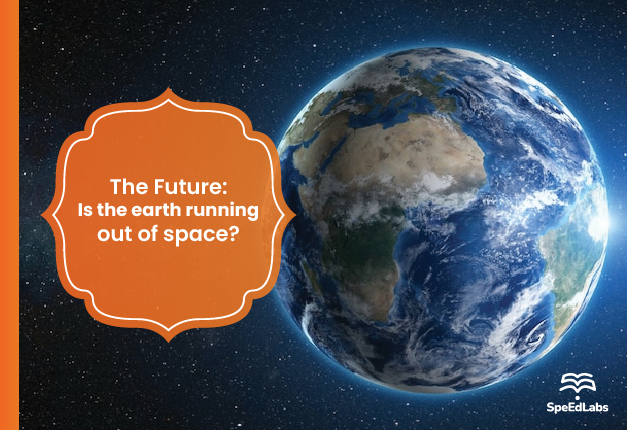A few years ago, Stephen Hawking declared: “We are running out of space, and the only places to go are other worlds. Now is the time to investigate other solar systems. Perhaps the only thing that can save us from ourselves is to spread out. Humans must depart from Earth, in my opinion.”
The entire world is very large. It is home to 8 billion people, more than 8 million animal species, and an enormous variety of plants and insects. We are all housed on it, and 71 per cent of it is covered in water. It also provides us with food and access to its resources.
“The Earth will expire by 2050”
This was the headline of an article published in 2002 in the British newspaper The Guardian.
Will we ever run out of space on Earth given that the population is increasing at an alarming rate of 1% per year and resources are depleting at even faster rates?
The answer is not simple and is based on a huge number of variables. However, if we comprehend the definition of “space” and consider how the population will increase over the next 100 years, we can get a general idea.
Actual Space
Half of the Earth’s land, or the 29% of it that is covered by water, is used for agriculture, including farms, irrigation systems, and homes for cattle (the other half is either frozen or barren land like deserts).
- Most of the other half is made up of shrubbery and forests (areas covered in shrubs). In addition, what’s left, or 1 per cent, is made up of roads, cities, towns, villages, and any other area that has been constructed by humans. Thus, the physical space we have is already quite limited.
- Geographical factors and the way we humans have constructed our communities have led to an uneven distribution of even that one per cent of land throughout the world.
Climate Change
Global warming or rather humans who induced climate change is the true culprit in this situation, as it is in most situations. We will need to genuinely inquire as to whether there is enough room left for everyone due to global warming and climate change.
- Water levels are rising due to global warming, and if that continues, nearly half of humanity will experience severe flooding and be forced to relocate.
- The amount of land that is available for our use will decrease as a result.
- The landscape is changing because of climate change. Due to deforestation and increased forest fires, we have fewer forests.
- Due to the use of dangerous pesticides and poor farming practices, agricultural land is becoming less fertile.
- Farmland, mountainous areas, and forests are also being developed into buildings as cities and towns grow to accommodate more residents.
Resources
As mentioned earlier, agriculture occupies roughly half of the planet’s habitable (or liveable) land. This is significant to consider because it is impossible to use the agricultural land on this half of the planet—which is used to feed humans and other animals—to build homes for the growing population.
- Resources are another significant thing that occupies the land.
- We require a variety of essential resources to survive, including food, water, wood, soil, and minerals. Thus, we are unable to enter the area of land that is suitable for human habitation that is covered by mines, forests, or farms.
- More people means we need more of all these resources, which we might not have, so an expanding population will only increase pressure on these areas.
Will we eventually run out of room for people?
Even though it seems very likely to occur, experts say it might not. By 2050, the population of the world is projected to reach over 9 billion people, but experts predict that after that, it will stabilise, preventing a rapid increase to 10 billion people.
We might still have hope for a growing population if we implement stringent, preventative measures against global warming today. In addition, about 784 million people lack access to clean water, according to the World Health Organization, which estimates that more than 820 million people go hungry every day. Even though we have enough land to support our lives, we must also make sure we have enough to survive.
Also published on Medium.
